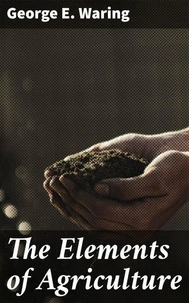The Elements of Agriculture. A Book for Young Farmers, with Questions Prepared for the Use of Schools
Par :Formats :
Disponible dans votre compte client Decitre ou Furet du Nord dès validation de votre commande. Le format ePub est :
- Compatible avec une lecture sur My Vivlio (smartphone, tablette, ordinateur)
- Compatible avec une lecture sur liseuses Vivlio
- Pour les liseuses autres que Vivlio, vous devez utiliser le logiciel Adobe Digital Edition. Non compatible avec la lecture sur les liseuses Kindle, Remarkable et Sony
 , qui est-ce ?
, qui est-ce ?Notre partenaire de plateforme de lecture numérique où vous retrouverez l'ensemble de vos ebooks gratuitement
Pour en savoir plus sur nos ebooks, consultez notre aide en ligne ici
- Nombre de pages166
- FormatePub
- ISBN859-65--4725001-2
- EAN8596547250012
- Date de parution04/09/2022
- Protection num.Digital Watermarking
- Taille743 Ko
- Infos supplémentairesepub
- ÉditeurDIGICAT
Résumé
In "The Elements of Agriculture, " George E. Waring presents a seminal work that intricately weaves together the scientific principles of agriculture with practical applications. This book, written in clear, accessible prose, stands out as a crucial text during the 19th century, a period marked by rapid advancements in agricultural science. Waring's methodical approach explores fundamental concepts, such as soil management, crop rotation, and the importance of sustainable practices, urging farmers to move beyond traditional methods in favor of evidence-based techniques.
His integration of empirical observations with theoretical frameworks reflects the burgeoning agricultural movement of the time, emphasizing the shift towards a more systematic understanding of farming as a science. George E. Waring, an influential figure in agronomy and environmental science, was driven by a desire to improve agricultural practices for both economic and ecological sustainability.
His experiences as a farmer and a land surveyor provided him with a unique perspective on the challenges faced by the agrarian community. Waring's dedication to education and reform in agriculture is evident throughout the text, where he champions the implementation of progressive techniques to enhance productivity and promote environmental stewardship. This book is essential for anyone interested in the foundations of modern agriculture, as well as for historians and environmentalists seeking insight into the evolution of farming practices.
Waring's clear exposition and passionate advocacy for scientific agriculture make "The Elements of Agriculture" a timeless resource, inviting readers to reflect on the critical relationship between agriculture and environmental sustainability.
His integration of empirical observations with theoretical frameworks reflects the burgeoning agricultural movement of the time, emphasizing the shift towards a more systematic understanding of farming as a science. George E. Waring, an influential figure in agronomy and environmental science, was driven by a desire to improve agricultural practices for both economic and ecological sustainability.
His experiences as a farmer and a land surveyor provided him with a unique perspective on the challenges faced by the agrarian community. Waring's dedication to education and reform in agriculture is evident throughout the text, where he champions the implementation of progressive techniques to enhance productivity and promote environmental stewardship. This book is essential for anyone interested in the foundations of modern agriculture, as well as for historians and environmentalists seeking insight into the evolution of farming practices.
Waring's clear exposition and passionate advocacy for scientific agriculture make "The Elements of Agriculture" a timeless resource, inviting readers to reflect on the critical relationship between agriculture and environmental sustainability.
In "The Elements of Agriculture, " George E. Waring presents a seminal work that intricately weaves together the scientific principles of agriculture with practical applications. This book, written in clear, accessible prose, stands out as a crucial text during the 19th century, a period marked by rapid advancements in agricultural science. Waring's methodical approach explores fundamental concepts, such as soil management, crop rotation, and the importance of sustainable practices, urging farmers to move beyond traditional methods in favor of evidence-based techniques.
His integration of empirical observations with theoretical frameworks reflects the burgeoning agricultural movement of the time, emphasizing the shift towards a more systematic understanding of farming as a science. George E. Waring, an influential figure in agronomy and environmental science, was driven by a desire to improve agricultural practices for both economic and ecological sustainability.
His experiences as a farmer and a land surveyor provided him with a unique perspective on the challenges faced by the agrarian community. Waring's dedication to education and reform in agriculture is evident throughout the text, where he champions the implementation of progressive techniques to enhance productivity and promote environmental stewardship. This book is essential for anyone interested in the foundations of modern agriculture, as well as for historians and environmentalists seeking insight into the evolution of farming practices.
Waring's clear exposition and passionate advocacy for scientific agriculture make "The Elements of Agriculture" a timeless resource, inviting readers to reflect on the critical relationship between agriculture and environmental sustainability.
His integration of empirical observations with theoretical frameworks reflects the burgeoning agricultural movement of the time, emphasizing the shift towards a more systematic understanding of farming as a science. George E. Waring, an influential figure in agronomy and environmental science, was driven by a desire to improve agricultural practices for both economic and ecological sustainability.
His experiences as a farmer and a land surveyor provided him with a unique perspective on the challenges faced by the agrarian community. Waring's dedication to education and reform in agriculture is evident throughout the text, where he champions the implementation of progressive techniques to enhance productivity and promote environmental stewardship. This book is essential for anyone interested in the foundations of modern agriculture, as well as for historians and environmentalists seeking insight into the evolution of farming practices.
Waring's clear exposition and passionate advocacy for scientific agriculture make "The Elements of Agriculture" a timeless resource, inviting readers to reflect on the critical relationship between agriculture and environmental sustainability.



